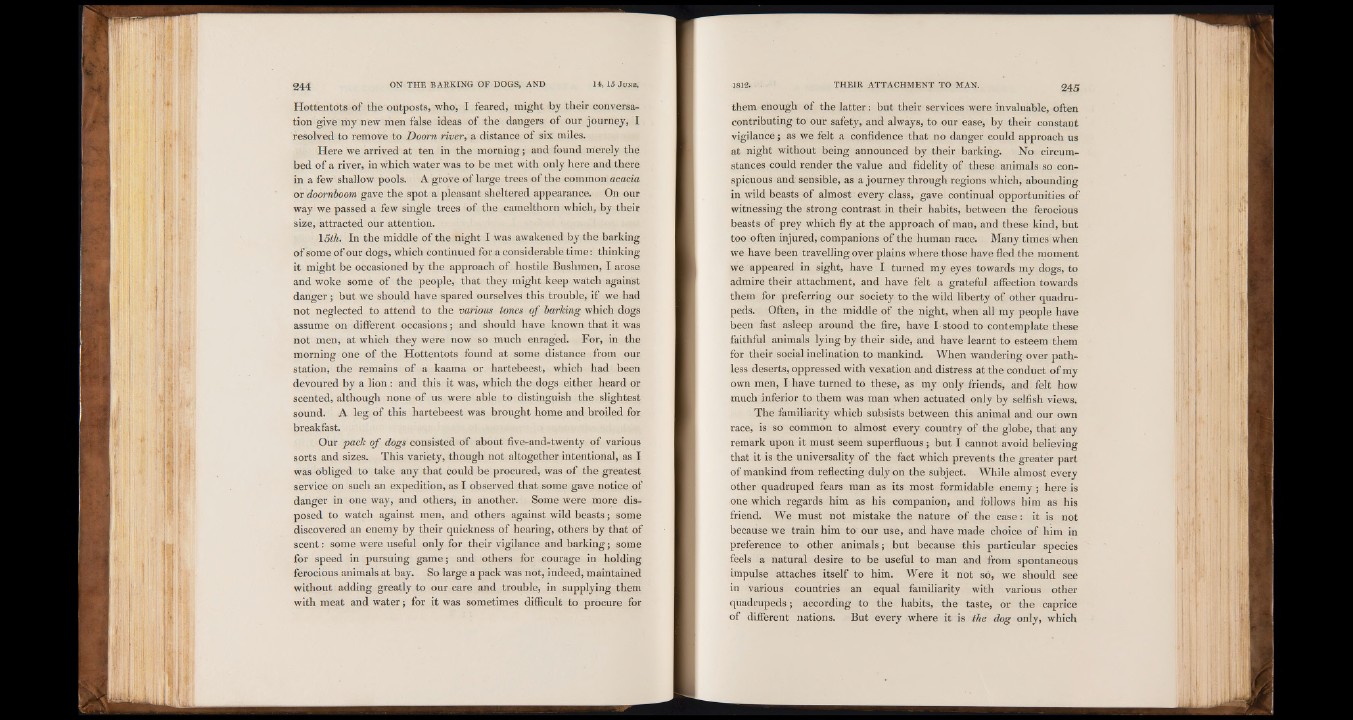
Hottentots of the outposts, who, I feared, might by their conversation
give my new men false ideas of the dangers of our journey, I
resolved to remove to Doom river, a distance of six miles.
Here we arrived at ten in the morning; and found merely the
bed of a river, in which water was to be met with only here and there
in a few shallow pools. A grove of large trees of the common acacia
or doomboom gave the spot a pleasant sheltered appearance. On our
way we passed a few single trees of the camelthorn which, by their
size, attracted our attention.
15th. In the middle of the night I was awakened by the barking
of some of our dogs, which continued for a considerable time: thinking
it might be occasioned by the approach of hostile Bushmen, I arose
and woke some of the people, that they might keep watch against
danger; but we should have spared ourselves this trouble, if we had
not neglected to attend to the various tones of barking which dogs
assume on different occasions; and should have known that it was
not men, at which they were now so much enraged. For, in the
morning one of the Hottentots found at some distance from our
station, the remains of a kaama or hartebeest, which had been
devoured by a lion: and this it was, which the dogs either heard or
scented, although none of us were able to distinguish the slightest
sound. A leg of this hartebeest was brought home and broiled for
breakfast.
Our pack of dogs consisted of about five-and-twenty of various
sorts and sizes. This variety, though not altogether intentional, as I
was obliged to take any that could be procured, was of the greatest
service on such an expedition, as I observed that some gave notice of
danger in one way, and others, in another. Some were more disposed
to watch against men, and others against wild beasts; some
discovered an enemy by their quickness of hearing, others by that of
scent; some were useful only for their vigilance and barking; some
for speed in pursuing game; and others for courage in holding
ferocious animals at bay. So large a pack was not, indeed, maintained
without adding greatly to our care and trouble, in supplying them
with meat and water; for it was sometimes difficult to procure for
them enough of the latter: but their services were invaluable, often
contributing to our safety, and always, to our ease, by their constant
vigilance; as we felt a confidence that no danger could approach us
at night without being announced by their barking. No circumstances
could render the value and fidelity of these animals so conspicuous
and sensible, as a journey through regions which, abounding
in wild beasts of almost every class, gave continual opportunities of
witnessing the strong contrast in their habits, between the ferocious
beasts of prey which fly at the approach of man, and these kind, but
too often injured, companions of the human race. Many times when
we have been travelling over plains where those have fled the moment
we appeared in sight, have I turned my eyes towards my dogs, to
admire their attachment, and have felt a grateful affection towards
them for preferring our society to the wild liberty of other quadrupeds.
Often, in the middle of the night, when all my people have
been fast asleep around the fire, have I stood to contemplate these
faithful animals lying by their side, and have learnt to esteem them
for their social inclination to mankind. When wandering over pathless
deserts, oppressed with vexation and distress at the conduct of my
own men, I have turned to these, as my only friends, and felt how
much inferior to them was man when actuated only by selfish views.
The familiarity which subsists between this animal and our own
race, is so common to almost every country of the globe, that any
remark upon it must seem superfluous; but I cannot avoid believing
that it is the universality of the fact which prevents the greater part
of mankind from reflecting duly on the subject. While almost every
other quadruped fears man as its most formidable enemy; here is
one which regards him as his companion, and follows him as his
friend. We must not mistake the nature of the case: it is not
because we train him to our use, and have made choice of him in
preference to other animals; but because this particular species
feels a natural desire to be useful to man and from spontaneous
impulse attaches itself to him. Were it not so, we should see
in various countries an equal familiarity with various other
quadrupeds; according to the habits, the taste, or the caprice
of different nations. But every where it is the dog only, which